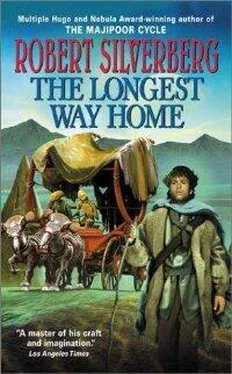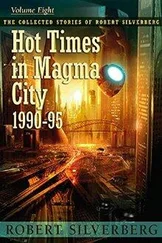“Not stop here,” the creature said, making a loose, swinging gesture with its arms. “Village over there.”
Village? By this time Joseph had given up all hope of the village’s existence.
The noctambulo turned again and went off in the direction from which it had just come. After a dozen steps or so it turned and plainly signalled to Joseph to follow along. Though he was at the edge of exhaustion, Joseph forced himself to go on. They descended a sloping plateau where the only vegetation was low sprawling shrubbery, as though they really had reached the far side of the forest at last, and then Joseph saw, clearly limned in the moonlight, row upon row of slender conical structures of familiar shape set close together in the field just before him, each one right up against the next, and he knew beyond doubt that he had finally come to the Indigene village that he had sought so long.
A wave of dizziness came over him in that same moment. Joseph could not tell whether it was born of relief or fatigue, or both. He knew that he had just about reached the end of his endurance. The pain in his leg was excruciating. He gripped his staff with both hands, leaned forward, fought to remain standing. After that everything took on a kind of red hallucinatory nimbus and he became uncertain of events for a while. Misty figures floated in the air before him, and at times he thought he heard his father’s voice, or his sister’s. When things were somewhat clear again he realized that he was lying atop a pile of furs within one of the Indigene houses, with a little ring of Indigenes sitting facing him in a circle, staring at him solemnly and with what appeared to be a show of deep interest.
“This will help your trouble,” a voice said, and one of the Indigenes handed him a cluster of green, succulent stems. One of their healing herbs, Joseph assumed. According to his father, the Indigenes had an extensive pharmacopoeia of herbal remedies, and many of them were said to be great merit. Joseph took the stems without hesitation. They were full of a juice that stung his lips and tongue, but not in any unpleasant way. Almost at once, so it seemed, he felt his fever lessening and the turmoil in his damaged leg beginning to abate a little.
He had been inside an Indigene house only once before. There was a settlement of Indigenes just at the border of the Keilloran lands, and his father had taken him to visit them when he was ten. The strange claustrophobic architecture, the thick, rough-surfaced mud-and-wattle walls tapering to a narrow point high overhead, the elaborate crosshatched planking of the floors, the slitlike windows that admitted only enough light to create a shadowy gloom, had made a deep impression on him. It was all much the same here, down to the odd sickroom sweetness, something like the odor of boiled milk, of the stagnant air.
Indigenes were found everywhere on Homeworld, though their aggregate population was not large, and apparently never had been, even in the years before the arrival of the first human settlers. They lived in small scattered villages in the forested regions that were not utilized by humans and also at the periphery of the settled regions, and no friction existed between them and the humans who had come to occupy their planet. There was scarcely any interaction between humans and Indigenes at all. They were gentle creatures who kept apart from humans as much as possible, coming and going as they pleased but generally staying on the lands that were universally considered to be theirs. Quietly they went about their Indigenous business, whatever that might be, without ever betraying the slightest sign of resentment or dismay that their world had been invaded not once but twice by strangers from the stars—first the easy-going villagers known as the Folk today and then, much later, the turbulent, more intense people whom the Folk had come to accept under the name and authority of Masters. Whether the Indigenes saw the Masters as masters too was something that Joseph did not know. Perhaps no one did. Balbus had hinted that they had a philosophy of deep indifference to all outside power. But he had never elaborated on that, and now Balbus was dead.
Joseph was aware that some Masters of scholarly leanings took a special interest in these people. His father was among that group. He collected their artifacts, their mysterious little sculptures and somber ceramic vessels, and supposedly, so said Balbus, he had made a study at one time of those profound philosophical beliefs of theirs. Joseph had no idea what those beliefs might be. His father had never discussed them with him in detail, any more than Balbus had. It was his impression that his father’s interest in Indigenes was in no way reciprocated by the Indigenes themselves: on that one visit to the village near House Keilloran they had seemed as indifferent to his presence and Joseph’s among them as the day-noctambulo had been when they were in the forest together. When Joseph’s father made inquiries about certain Indigene artifacts that he had hoped to acquire they replied in subdued monotones, saying as little as necessary and never volunteering anything that was not a direct response to something Joseph’s father had asked.
But perhaps they had felt intimidated by the presence among them of the powerful Martin Master Keilloran of House Keilloran, or else the Indigenes of the north were of another sort of temperament from those of Helikis. Joseph sensed no indifference here. These people had offered him a medicine for his leg, unasked. Their intent stares seemed to be the sign of real curiosity about him. Though he could not say why, Joseph did not feel like in the slightest way like an intruder here. It was more like being a guest.
He returned their stares with curiosity of his own. They were strangely handsome people, though distinctly alien of form, with long, tubular heads that were flattened fore and aft, fleshy throats that pouted out in flamboyant extension in moments of excitement. Their eyes were little slits protected by bony arches that seemed almost like goggles, with peeps of scarlet showing through, the same vivid color as the eyes of noctambulos. Those red eyes were a clue: perhaps these races had been cousins somewhere far back on the evolutionary track, Joseph thought. And they walked upright, as noctambulos did. But the Indigenes were much smaller and slighter than noctambulos in build, closer to humans in general dimension. They had narrow ropy limbs that looked as though they had no muscular strength at all, though they could muster startling tensile force when needed: Joseph had seen Indigenes lift bundles of faggots that would break the back of a sturdy Folker. Their skins were a dull bronze, waxy-looking, with unsettling orange highlights glowing through. Their feet were splayed, long-toed. Their double-jointed seven-fingered hands were similarly rangy and pliant. Males and females looked identical to human eyes, although, Joseph supposed, not to other Indigenes.
The Indigenes sitting by his bedside, who were eight or nine in number, interrogated him, wanting to know who he was, where he was going. No one of them seemed to be in a position of leadership. Nor was there any special order in the way they questioned him. One would ask, and they would listen to his reply, and then another elsewhere in the group would ask something else.
The dialect they spoke was somewhat different from the version of Indigene that Joseph knew, but he had no particular difficulty understanding it or in shaping his own responses so that the pronunciation was closer to what seemed to be the norm here. He had studied the Indigene language since early childhood. It was something that all Masters were expected to learn, as a matter of courtesy toward the original inhabitants of the planet. You grew up speaking Folkish too—that was only common sense, in a world where nine humans out of ten were of the Folk—and of course the Masters had a language of their own, the language of the Great Houses. So every Master was trilingual. It had been Balbus’s idea that Joseph study the language of Old Earth, also: an extra little scholarly fillip. It was ancestral to Master, and, so said Balbus, the more deeply versed you were in the ancient language, the better command you would have of the modern one. Joseph had not yet had time to discover whether that was so.
Читать дальше












